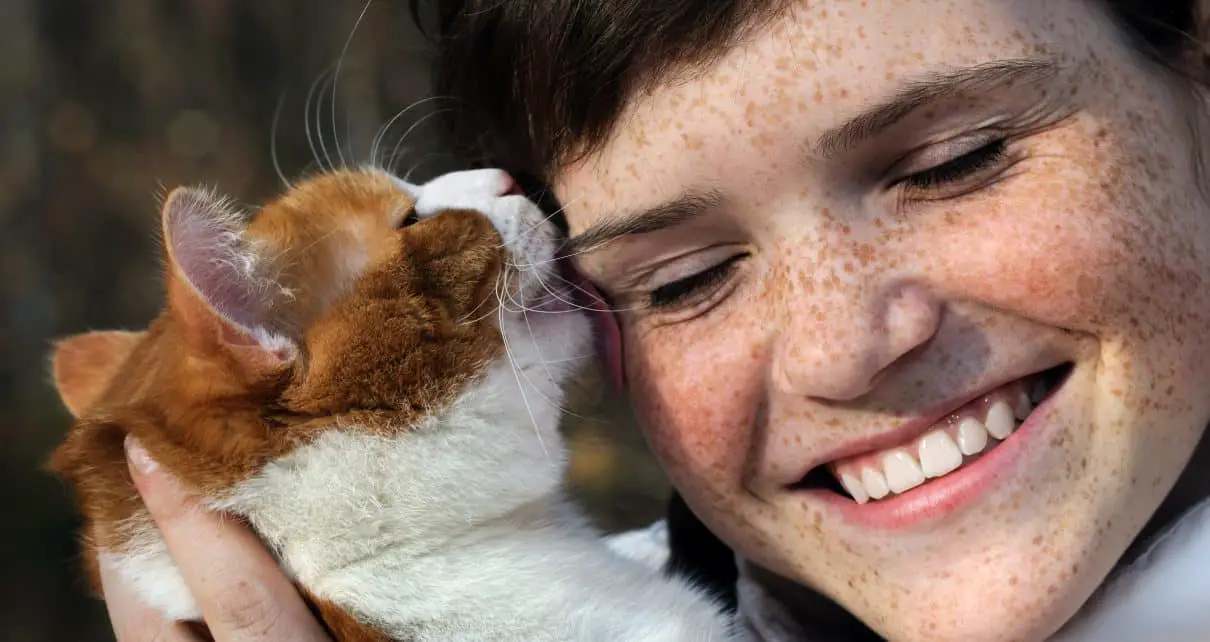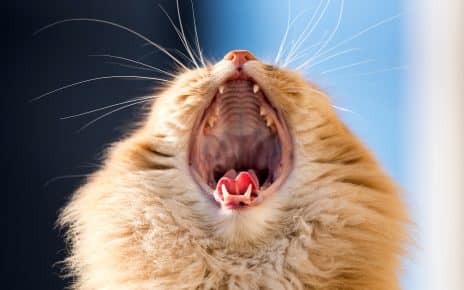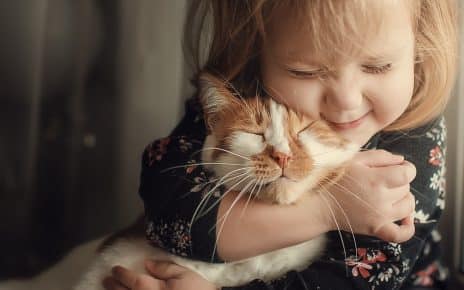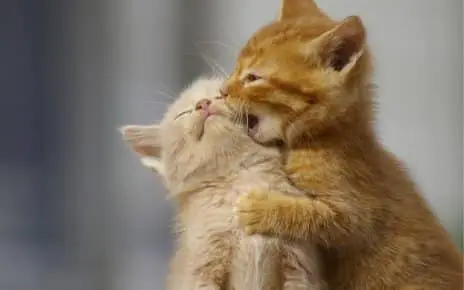Cats often get a bad wrap for not being affectionate. Is your cat one of them? It’s not their fault, cats just have their own love language.
Have you ever snuggled on the couch when all of a sudden — LICK. You get attacked by a rough little cat tongue. Consider it a major compliment! Licking their humans is one of their love languages. Every cat has its own personality so don’t be offended if your cat doesn’t lick you. They still love you. They just show it differently.

Now that you know licking is a language, let us decode what your cat is really saying. A lick could mean…
“I Love You”
Ever wonder if your cat loves you? If your kitty is licking you, there is no need to wonder. A mother cat licks its kittens to keep them clean but this tender moment is not just for hygiene. Licking is a way of showing affection. Kittens pick up the habit and groom their siblings as a way of bonding. Cats that were weaned from their mother prematurely are more likely to lick their human. Cats groom themselves to keep up their appearance when they feel happy and that happiness extends to licking you. Some cats take longer to bond with their humans so this may be a fairly new behavior for your cat. Licking shows that you both have an affectionate bond.
“Thank You”
You take care of all your cat’s needs. You feed them and play with them. You clean out their smelly litter box. Caring for your cat takes work. The least they can do is thank you! Licking is their way of thanking you for making them feel comfortable and safe.
“You Smell Weird”
Does your cat rub on your legs as soon as you get home? Especially if you have been hanging out with another cat? Your cat may be jealous. Another compliment! They can smell the other cat and are trying to mark you with their scent. You are their human after all and they are reclaiming you. Licking makes you smell like them again. And they’ll smell a little like you too.
“Welcome Home”
Does your cat groom you after you come home from being away? They missed you while you were gone and are welcoming you home the best way they know how. By licking you, of course.
“I Want Attention”
Has your cat ever sat on your keyboard as you try to type or lay on the book you were reading? You’ve been working hard. They are giving you permission to take a break from your work. To pet them, of course. Your cat’s licking may be accompanied by meowing or rubbing. If so, they are demanding your attention and will not rest until you give in. Especially if your cat is a Sphynx or Siamese. Do yourself the favor and give in. Your work can wait.
“You Taste Good”
After serving your cat or yourself dinner, the smell of food on your hands will send your cat’s nose twitching. It smells delicious and they want to lick any leftovers off your hands. Licking up the leftovers is also a survival instinct. Cats bathe after eating to fend off predators by getting removing the evidence of food. Who needs a sink, your cat has your back.
“I Don’t Feel Well”
Cats would make the best poker players because they have incredible poker faces. They are notorious for hiding illness and pain. When it comes to cats, it’s important to take note of any difference in behavior no matter how insignificant it may seem. If your cat starts to lick you when they don’t normally lick you, it may indicate that something more is going on.
If your cat’s licking is causing any concerns, reach out to your vet. Obsessive licking can be caused by anxiety or stress. Allergies may also cause your cat to lick one area excessively. This can cause skin irritation and can cause a hot spot. A hot spot occurs when the skin becomes raw from licking. If you notice your cat over licking, try to stop them. You can apply some icy hot or cat bitter spray around the area to deter them from licking at it. They don’t like the taste and will avoid licking that area.
Bet you didn’t know a simple thing like a cat’s licking could say so many different things. Now that you know what they are saying, how should you respond?
“I Love You Too”
If you enjoy your cats licking, it’s okay to let them. Be cautious about where your cat licks you and avoid having them lick your face. Some illnesses can transfer from animals to humans. The most commonly known illness is Cat-scratch fever, a bacterial infection that is transmitted through your cat’s saliva. The bacteria can be harmful if it gets in your eye or an open cut. In addition to bacteria, cats often kill rodents that may carriers of other illnesses. and grooming themselves meaning they may have licked some questionable things.
Another area to avoid licking is your hair. This is more for comfort than health. For those who have cats that are fond of licking their human’s hair may have found out that a cat’s tongue is powerful enough to pull out a few strands. Limit the length of time that your cat licks you. After a prolonged period of licking your skin may become irritated.
“I Love You Too But…”
Many owners don’t enjoy their cats licking. A cat’s tongue is designed for thorough cleaning and removal of dirt giving it a sandpaper texture. It’s okay, they’re not offended. You can still show your cat you love them while stopping them from licking you.
Try redirecting their attention by engaging in a different activity together. You could grab a brush and gently groom them or grab their favorite cat toy for some playtime. Some cats enjoy laser pointers, fishing toys, or feathers. It’s important to find a toy that your cat enjoys. Cat trees and tunnels are also a way for your cat to play. Different cats will respond to different types of play.
Offering them a healthy cat-friendly treat is another great way to redirect their attention. If redirecting them doesn’t work, you can try walking away. This will give them time to calm down. It’s okay for both of you to do your own thing in the same space. Your cat will begin to associate licking you with you leaving. After a bit of training, they will learn not to licking you is not the best way to spend time with you.
Always be gentle when trying to break the licking habit. Avoid yelling, pushing your cat away, or using bitter-tasting products on your skin as they will associate negative feelings with spending time with you.
However, you choose to respond to your cat’s licking, at least now, you’re both speaking the same language.




My cat doesn’t seem to be a licker. Wish he was. Guess some cat just are not.
Mine always meows when she’s hungry or sick it seems. Certainly not for love.